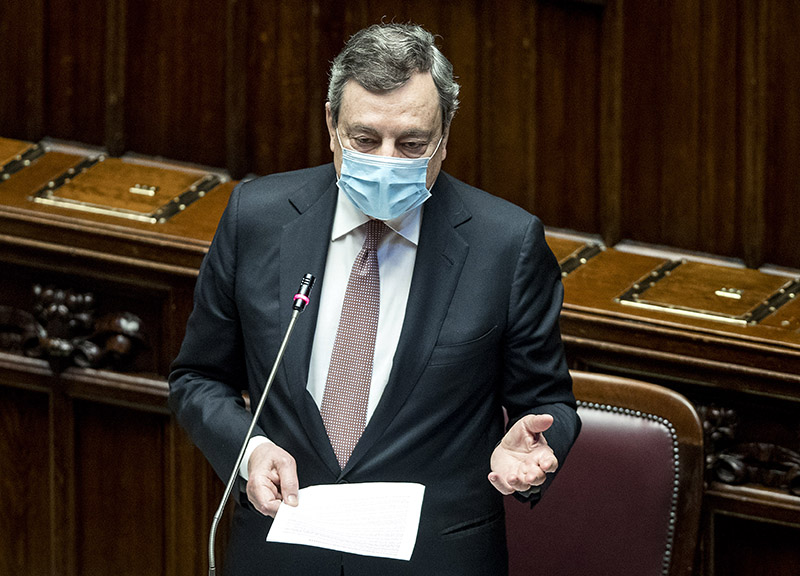As Mario Draghi tries to push the country out of the shallow waters of a tragic epidemic, Italy seems to have the unenviable advantage of being the first European country to enter a state of emergency and, unfortunately, the last to leave. Not to mention the number of victims, which is perhaps the highest in all of Europe.
Of the 27 countries in the European Union today, only seven are still disturbed. They are part of the group Italy, Bulgaria, Finland, France, Hungary, Luxembourg and Slovakia. All other countries have withdrawn the containment measures.
Only Italy plans to extend it until at least July 31.
This was revealed through the work done by the European Parliament on behalf of the Civil Liberties Committee.
The commission constantly monitored the evolution of the rules that led to the unprecedented suppression of fundamental freedoms.
But restrictive measures continue to a greater or lesser extent, and the Civil Liberties, Justice and Home Affairs Authority is constantly monitoring the risk that some governments will take advantage of the pandemic to unnecessarily restrict some freedoms. This temptation is evident in countries where crisis coincides with political unrest or protests, for several reasons.
The European Parliament report referred, for example, to the case of Bulgaria, where the government tried to change the penal code to include fines and prison sentences for divulging false information, but the president rejected the proposal.
In Germany, protests against the restrictions were repeated during the pandemic, with many clashes with police authorities, and Angela Merkel’s federal government chose a law granting her extraordinary powers to impose a curfew on land vehicles.
In Hungary, according to Amnesty International, Viktor Orban’s government used sanitary measures to restrict freedom of expression and the right to assembly.
But in this dramatic year, there have also been some virtuous examples of solidarity. One of them is Portugal, which, until at least 30 June, recognized all asylum seekers the same rights as the Portuguese to facilitate access to health and social services.
France will leave the health emergency on June 2. But things will gradually return to normal. Between that date and October 31, there will be a transition period during which the prime minister, in the event of the epidemic resuming, can impose measures that restrict the movement of people. The prime minister will no longer be able to impose a national curfew, but only at the local level. In short, a gradual exit that is done with great caution.
Instead, Italy extended the state of emergency until July 31. The decision was to carry out the vaccination campaign and follow the CTS guidelines. But political confrontations and discontent particularly in the squares are daily because Italians no longer tolerate closures that are often considered contradictory.
Germany has never implemented a state of emergency during the pandemic. Angela Merkel’s government has agreed to restrictive measures with 16 landing craft. Lander who, however, has not followed a set order in recent months and, in some cases, has not respected federal dictates. The government was forced to change a law to impose common measures across the country, forcing the rebels to take measures such as curfews.
There has never been a real emergency in the UK. Parliament passed a law to give the government extraordinary powers that were never used ruthlessly.
Belgium fought the pandemic by imposing very strict restrictions, even though a state of emergency was not included in the constitution. The Belgian government with exceptional powers decided to close the entire hotel sector from October 2021 (until the partial opening on May 8); All entertainment venues, cinemas, theaters and gyms will be closed until June 8; All hairdressing and beauty centers are closed until February. By decree, the curfew was imposed from midnight and ended last Friday.
Social discipline continued during these months, but protests increased against the suspension of basic rights by decree. The case reached a stalemate, but it did
He indicated that it is unlikely that public opinion will allow the imposition of drastic measures by decree in the event that new waves of wounded appear after the summer. The Belgian Parliament is drafting a law that makes it possible to combat the virus with exceptional measures, but is subject to legislative scrutiny.



![[VÍDEO] Elton John’s final show in the UK has the crowd moving](https://www.lodivalleynews.com/wp-content/uploads/2023/06/Elton-John-1-690x600.jpg)


More Stories
Anita displays Christmas decorations in a luxury mansion in the United States
The Fast and Furious actor was arrested in the United States
[VÍDEO] Elton John’s final show in the UK has the crowd moving